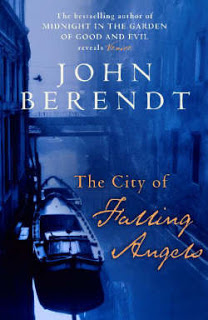Many on-line reviews of this book compare it too closely, and unfavourably to the author's quite brilliant account of a murder and its subsequent trials in the American city of Savannah - 'Midnight in the Garden of Good and Evil'. This is a completely different type of book from the former, and I think it unfair to compare the two too closely. This too is about a crime, but the crime forms the backdrop to what is really a tribute to a very old, very beautiful, special and quite mysterious city.
Venice, surely, would be on most people's bucket list of cities to visit, and hopefully spend more than a day or two in. John Berendt does exactly that, his arrival coinciding with a massive fire which destroyed the iconic 160 year old Fenice Theatre. His intention was to spend a few weeks exploring the city and its surrounds, meeting Venetians but it would seem his enquiring journalistic nature got the better of him and he found himself caught up in the mystery of how the fire happened.
He meets many, many people, some interesting, some not so much, but all with a story to tell and a theory on the cause of the fire. In the first few pages we meet one of the most famous Venetian glass blowing families and later read about a massive family feud between two of the brothers that has torn the family apart. He meets the son of Count Volpi, a businessman and politician who contributed to much of the development of the infrastructure of Italy and left his legacy in founding the Venice Film Festival. Unfortunately for him and his son he was also a close associate of Mussolini. Perhaps the most fascinating character is the Rat Man of Treviso - too special to give further details of here.
One of the many criticisms of this book has been the focus on the large number of American expatriates who have close ties with Venice, rather than the Venetians themselves. Yes, these expats are all rich, their cups runneth over with their own self-importance and self-interest, but nevertheless their stories are still very, very interesting. From the beautiful sounding palaces they live in, exquisite works of architecture that somehow still seem to stay upright a few hundred years after being built, to their social connections, how they make their money, to their use of boats as a form of transport, to the lady who wears only white - riveting stuff.
Every second or third chapter there is an update of the investigation into the cause of the fire and the subsequent trial of those deemed responsible. And that would make a book in itself.
But of course the main star is the city itself. It is obvious the author adores the city, its age, its durability and defiance. He provides bits of history - the city's dominance as a commercial and trading power in the 1400s, its conquest by Napoleon in the late 18th century and even such interesting details as the origin of the word ghetto which was a locality in the city where the Jews lived, and still is today. He creates gorgeous images of what the city looks like, its atmosphere and essence, how the real life of the city is behind the main canals, and that the best time to visit is early February -after the Christmas/New Year holiday rush and before Carnival.
Reading this book has put spending some time in Venice further up the bucket list than it was. Fascinating, interesting and compelling reading.




